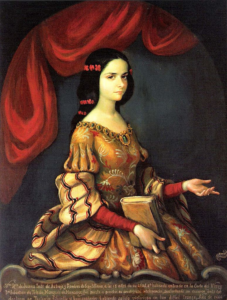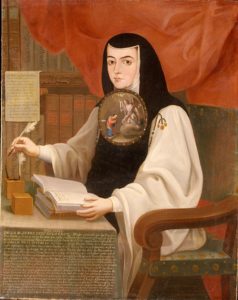 From top to bottom: Sor Juana printed on Mexican currency, the Netflix series about her, and the banner from her former convent turned renowned University.
From top to bottom: Sor Juana printed on Mexican currency, the Netflix series about her, and the banner from her former convent turned renowned University.She’s on the Mexican 200 peso bill.
She has a University named after her.
She has a Netflix series about her.
She is the subject of The Tenth Muse.
Who is she?
Sor Juana Inés de la Cruz.
Knowing the importance of this incredible person, Oregon Shakespeare Festival commissioned Tanya Saracho to write a play based on Sor Juana. And now, Davis Shakespeare Festival is proud to be producing The Tenth Muse as one of our summer shows this 2019 season.
So, who really is this “Tenth Muse”?
Sor Juana is one of Mexico’s greatest poets, historical figures and early feminists. She was also a dramatist, a composer, an intellectual, and a Catholic nun. The poems, plays, and writings of Sor Juana are provocative and fearless in spite of the rigidity of 17th century Catholicism. To this day, we honor Sor Juana as a symbol for women’s empowerment, women’s education, and her dedication to the pursuit of knowledge.
 Portrait of Sor Juana, Artist unknown.
Portrait of Sor Juana, Artist unknown.Early Life of Sor Juana
Sor Juana was born Juana Inés de Asbaje y Ramírez in colonial Mexico around 1651. Her mother birthed her out of wedlock and her family was not wealthy. She had a natural inclination to learn. At the age of 3 she learned to read and write. By 8 she wrote her first poem dedicated to the Eucharist.
She loved learning so much she would she sneak into her grandfather’s library and pour over the books inside. Soon she was a self-taught expert in math, science, and Catholic theology. She studied several languages including Latin and the Aztec language Nahuatl. Her studies influenced her poetry and she interwove everything she learned into her writing.
As she got older, Sor Juana’s desire to learn grew stronger, but she faced many obstacles while reaching her goals. Women in colonial Mexico were not allowed to receive a higher education. But, Sor Juana was desperate to learn and she begged her mother to let her attend university dressed as a man. The world had set limits for her, but she would let nothing stop her from getting the education she deserved.
Life in the Court: Fancy but Not Free
As a teenager, Sor Juana lived in Mexico City. The thought was that courtly life would offer more opportunities and maybe she would find a suitable husband. Instead, the Viceroy and Vicereine, who were hand-picked representatives of Spain in the colonies, employed Sor Juana. She was the darling of the Vicereine and her lady-in-waiting.
With their encouragement, Sor Juana wrote and performed poems, plays, sonnets, and verses. Her beauty and intelligence made her famous throughout the court. Infamously, a panel of 40 scholars and intellectuals comprised by the Viceroy tested her intelligence about literature, theology, history, and science. She blew everyone away by acing every question.
To Become a Bride or a Bride of Christ?
Courtly living wasn’t fulfilling enough for Sor Juana. She felt like she was writing for other people and not for herself. There weren’t many options for women of her status. Her options were marriage or life in a monastery. She refused to engage in any lifestyle that would prevent her from getting an education. She detested the idea of becoming a wife. Money, fame, and husbands could never take the place of her love for learning and writing.
With no desire to get married and no desire to write for anyone other than herself, she chose a life that would allow her the opportunity to put education first.
 Portrait of Sor Juana.
Portrait of Sor Juana.Choosing the Cloister
Juana Inés de Asbaje y Ramírez became Sor Juana Inés de la Cruz. She entered the cloister at the convent of San Jeronimo and remained there until the day she died. Most people would find confinement in the cloister, but for a moment Sor Juana found freedom.
The convent gave her more self-fulfilling opportunities. They afforded her a decent apartment, which she made into the most extensive library in the New World. After her monastery duties concluded, she was able to read, write, compose, and study freely. In the convent she wrote some of her most beloved works.
Working Writer, Radical Nun
Sor Juana had an incredible range. She did not just write about Christianity. Sure, she wrote about God. But, she also wrote about themes most important to her, both personally and politically. In one poem she may be describing the passions or pains of love but in another piece she’s dissecting the unfairness of male privilege.
Her work became famous throughout the Spanish speaking world both in the Americas and Europe. The Viceroy and Vicereine commissioned and published her work, making her one of the first acclaimed poets in the New World. Sor Juana was a famous but controversial figure. In some circles, they respected her for her brilliant ideas but in others she was detected for her critique of misogyny.
Dedication to Her Cause
Sor Juana’s outspoken and radical nature made her a target of the Church. Without her knowledge, a private personal letter where she critiqued a well known sermon was published under the pseudonym “Sor Filotea”. This letter received a ton of backlash and her critics, many of them male and in power, undermined her intelligence.
As a response, Sor Juana defended herself by writing the Respuesta a Sor Filotea de la Cruz, in which she logically argued for women’s right to education. In the letter, Sor Juana wrote that God had given her intelligence, that he was the reason for her desire to learn, and that God alone knows why he gave her this gift. Her proto-feminist letter remains as a touchstone for contemporary feminism.
However, by 1694, she sold her great library and abandoned her literary pursuits. Most speculate it is due to societal pressures both inside and outside the convent. She never wrote again and died humbly while aiding her sisters during a plague epidemic.
Legacy
Sor Juana has earned the name the Tenth Muse. Like Sappho the poetess, who the Greek refer to as the Tenth Muse, Sor Juana’s poetry and art continues to inspire feminists, artists, and intellectuals to write, to read, and to relentlessly pursue their dreams in spite of oppression.
Sor Juana’s influence lives on in her writing and in her readers. In Mexico City, the convent of San Jeronimo has transformed into a renowned University in honor of her legacy. Countless books, a movie and a television series have been made in her name. And now, the Davis Shakespeare Festival is celebrating her by bringing The Tenth Muse to the 2019 summer stage!
By Mia Tapnio for Davis Shakespeare Festival
April 23, 2019
Sources (and for more information):
https://www.britannica.com/biography/Sor-Juana-Ines-de-la-Cruz
https://www.poets.org/poetsorg/poet/sor-juana-inés-de-la-cruz
https://www.biography.com/people/sor-juana-inés-de-la-cruz-38178